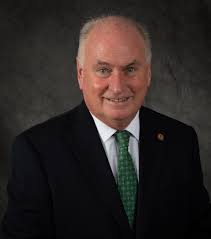Brady to run against Mwilambwe for Bloomington mayor
By Bill Dwyer For Chronicle Media — May 8, 2024
Dan Brady
An online photo shows former state Rep. Dan Brady smiling as he stands next to Mboka Mwilambwe at the Bloomington mayor’s swearing-in ceremony in 2021.
Brady, whose last political campaign was in 2022 for Illinois secretary of state, will now oppose Mwilambwe on next year’s ballot for Bloomington mayor.
Mwilambwe won in 2021, during the COVID pandemic lockdown, garnering 38.7 percent of the vote against two opponents with no experience in elective office, edging out business consultant Mike Straza by 1.8 percent.
He won’t be facing a political novice in next year’s election.
In his April 29 candidacy announcement, Brady noted what everyone in Bloomington already knows, that he was born and raised in the city. Brady said he had “spent much of my adult life representing the people of my hometown.”
Brady also stressed his long history with Bloomington politics.
“I have worked with five Bloomington mayors, numerous City Council members and city managers. Whether it was helping to secure funding for road projects, public safety, or infrastructure, I have always been there for Bloomington and have worked to provide a better quality of life for its residents.”
However, for all his political history, Brady contends that the mayor’s race “is not about a political party, it’s about people over politics. That’s how I have earned my reputation as a common-sense trusted public servant.”
Brady said his mayoral campaign “will include plans to enhance public service and public safety, create affordable housing, lower taxes, and support businesses and economic development with a new leadership style.”
Hours after Brady’s campaign announcement April 29, Mwilambwe declined an interview request from Bloomington television station WMBD, but did issue a one-line statement, saying he “welcomed” Brady’s announcement.
Mwilambwe moved to Central Illinois in 1990 and enrolled at Illinois State University, where he earned his degree. He is listed on the university website as the interim director of the Office of Equal Opportunity and Access.
Just three years after being sworn in as a U.S. citizen, Mwilambwe was appointed to the Bloomington City Council in 2011. He was re-elected in 2013 and 2017. When he was elected as Bloomington’s first Black mayor in the city’s nearly 200-year history, the news was broadcast in his birth country, the Democratic Republic of the Congo.
When Mwilambwe announced his intention to run for a second term as mayor three weeks ago on radio station WLGT, he said a key focus in his second term would be comprehensively addressing a troubling housing shortage in Bloomington and neighboring Normal, including affordable housing availability.
Another key focus, he said, would be a possible Tax Increment Financing District for the downtown area. Mwilambwe said he was excited by the possibility “to be a little bit more aggressive in seeking funding from grants and our congressional elected officials and also at the state level.”
The Bloomington municipal elections are the consolidated primary (only if required) on Feb. 25, and the consolidated election on April 1.







